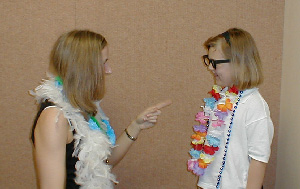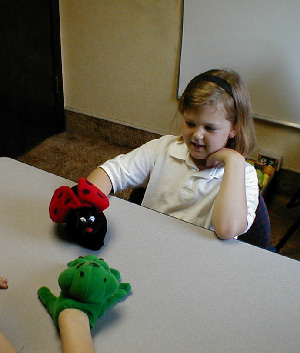An Interview With Caroline: You Can Do Something About Teasing!
 |
About the presenter: Lynne Shields, Ph.D., CCC-SLP, is a professor and graduate program director in the Department of Communication Disorders & Deaf Education at Fontbonne University in St. Louis, Missouri. She teaches courses in assessment, fluency, language disorders and birth-to-three, and supervises in the on-campus clinic. She has obtained Fluency Specialty recognition. |
 |
About the presenter: Caroline L. lives in St. Louis, Missouri and is now in the first grade. She lives with her Mom and little sister. Her favorite things to do are swimming and doing arts and crafts. She also has a favorite doll named Kirsten, and you can fix her long hair. Some of her friends are Connor, Jacob and Madeline. |
An Interview with Caroline: You can do something about teasing!
by Lynne Shields & Caroline L.
from St. Louis, Missouri, USA
 The focus of this paper is an interview conducted this past spring with Caroline concerning how she learned to handle teasing about her speech. First, let me introduce Caroline to you. She is six years old and has a very open and engaging personality. She smiles readily and loves to talk. Caroline was quite determined to do something about her stuttering when she first visited the speech and language clinic at Fontbonne University in September of 2001. During the initial evaluation, she described her disfluencies as "bubbly talking", and indicated that when her words were bubbly, it was hard to get them to come out of her throat. She also spoke of having problems with her kindgergarten classmates teasing her about her stuttering, and about how sad that made her feel.
The focus of this paper is an interview conducted this past spring with Caroline concerning how she learned to handle teasing about her speech. First, let me introduce Caroline to you. She is six years old and has a very open and engaging personality. She smiles readily and loves to talk. Caroline was quite determined to do something about her stuttering when she first visited the speech and language clinic at Fontbonne University in September of 2001. During the initial evaluation, she described her disfluencies as "bubbly talking", and indicated that when her words were bubbly, it was hard to get them to come out of her throat. She also spoke of having problems with her kindgergarten classmates teasing her about her stuttering, and about how sad that made her feel.
Therapy for Caroline addressed several aspects of stuttering. First, Caroline learned about the parts of her body that are used to produce speech and how they work when she's fluent and when she has bubbly speech. She and her student clinician also worked on using easy onsets and stretches at the beginning of words, to help Caroline manage her speech when she had bubbly words. Along with these aspects of therapy, Caroline was encouraged to talk about how she felt about what she was experiencing. Following is a description of the steps taken in helping Caroline devise a strategy for dealing with teasing about her speech. To address Caroline's concerns about teasing, we first went to the Internet and visited The Stuttering Homepage's "Just for Kids" webpage. One of the articles records stories submitted from many children about how they handle teasing about their stuttering. We read some of these to Caroline to give her ideas about different ways to react to stuttering. She selected one or two that she liked. Next, we had Caroline role play these responses to teasing using one of her favorite activities, dress-ups. Caroline and the student clinician each brought in dress-up clothes, changing both their costumes, as well as who played the teaser and who took the part of Caroline. This allowed Caroline to experience and experiment with both roles. She loved doing this, and asked to do this activity repeatedly over the next several weeks. Then, one day, she came to therapy so excited, reporting to us that she had tried one of the responses she practiced when a classmate had teased her, and that the girl had stopped teasing her and played with her instead.While this was a wonderful breakthrough for Caroline, it was not the end of the story. For the next few months, she expressed no concerns about her speech and reported that no one was bothering her. She seemed uninterested in talking about how other people responded to her speech, so therapy focused more on refining and generalizing her skills in managing her fluency. We continued to bring up issues about feelings, so that she would feel free to speak up if she had further concerns. Sometime in January of this year, she came to therapy reporting that she was getting teased again by the same girls who had been doing this a few months earlier. So, we began using role-playing again, expanding the types of responses she practiced, using dress-ups as a vehicle, as before, and adding puppet play. Photos accompanying this article show Caroline with her most recent student clinician, Beth Frey, engaged in puppet play and dress-ups, practicing different ways to tease and to respond to teasing.Now, let's hear from Caroline, who graciously agreed to be interviewed about her experiences with teasing and how she handles it. Following is the interview, which was conducted in April of 2002:
To address Caroline's concerns about teasing, we first went to the Internet and visited The Stuttering Homepage's "Just for Kids" webpage. One of the articles records stories submitted from many children about how they handle teasing about their stuttering. We read some of these to Caroline to give her ideas about different ways to react to stuttering. She selected one or two that she liked. Next, we had Caroline role play these responses to teasing using one of her favorite activities, dress-ups. Caroline and the student clinician each brought in dress-up clothes, changing both their costumes, as well as who played the teaser and who took the part of Caroline. This allowed Caroline to experience and experiment with both roles. She loved doing this, and asked to do this activity repeatedly over the next several weeks. Then, one day, she came to therapy so excited, reporting to us that she had tried one of the responses she practiced when a classmate had teased her, and that the girl had stopped teasing her and played with her instead.While this was a wonderful breakthrough for Caroline, it was not the end of the story. For the next few months, she expressed no concerns about her speech and reported that no one was bothering her. She seemed uninterested in talking about how other people responded to her speech, so therapy focused more on refining and generalizing her skills in managing her fluency. We continued to bring up issues about feelings, so that she would feel free to speak up if she had further concerns. Sometime in January of this year, she came to therapy reporting that she was getting teased again by the same girls who had been doing this a few months earlier. So, we began using role-playing again, expanding the types of responses she practiced, using dress-ups as a vehicle, as before, and adding puppet play. Photos accompanying this article show Caroline with her most recent student clinician, Beth Frey, engaged in puppet play and dress-ups, practicing different ways to tease and to respond to teasing.Now, let's hear from Caroline, who graciously agreed to be interviewed about her experiences with teasing and how she handles it. Following is the interview, which was conducted in April of 2002:
Lynne: Can you tell me a little bit about your bubbly talking?
Caroline: Well, it's like something in my throat, and it's not working really well. So, I have to use easy talking and my stretchy talk.
Lynne: You've told me that somebody at school has been bothering you. Can you tell me about that?
Caroline: Yes. Taylor and Bo were bothering me.
Lynne: What did they say to you?
Caroline: "There's that crazy girl!"
Lynne: They say that about you? That doesn't feel very good, does it?
Caroline: No, it doesn't.
Lynne: Sometimes, do they tease you about your bubbly speech?
Caroline: Yes.
Lynne: What kinds of things do they say to you?
Caroline: "You don't know how to talk, girl."
Lynne: Can you tell me about how that makes you feel?
Caroline: It makes me feel sad -- because I'm different. But, I'm still a person like them.
Lynne: That's right. You are. Before you started working on what to do when you were teased, what did you do when they would say things like that to you?
Caroline: Well, I would just run away, or cry, or just tell the teacher. But, then, a lot of people made fun of me. When I came to speech (therapy), I learned more words.
Lynne: When you learned more words, you learned how to handle (the teasing). You learned how to deal with it -- is that what you mean?
Caroline: Yeah.
Lynne: What did you do in your speech therapy to learn about how to handle that teasing?
Caroline: What I did is listen really carefully. She (the student clinician) teached me some words. I went to school and when people would start to tease me I said the words.
Lynne: So, you said the words you learned in speech and then the kids would be nicer?
Caroline: Yes.
Lynne: Can you give me an example of one thing that you said? What if they said something like, 'You talk funny'?
Caroline: Well, at first I just said -- this is the only one I knowed at first -- if they were trying to speak like me then I would say 'that's not how to do it'.
Lynne: So, they tried to imitate how you talk bubbly? And, then (after you said something) they would stop teasing?
Caroline: Yes.
Lynne: What's another one you like?
Caroline: I also learned 'what if you had bubbly speech and I was making fun of you?' And, then they would say, 'I'd feel pretty bad', and then I said 'well that's how I feel.'
I tried it with Bo and Taylor, but they didn't listen.
Lynne: They weren't good listeners. Who's got the problem then -- you or them?
Caroline: Them.
Lynne: You're right about that. Do you feel O.K. telling the teacher when they won't listen?
Caroline: Yes.
Lynne: It sounds as if sometimes it works to talk to someone when they tease you, and sometimes it doesn't work.
Caroline: Yeah, sometimes it doesn't.
Lynne: How do you feel about that? You try to do something positive, and, if it works, it feels good. What if it doesn't work?
Caroline: If it doesn't work, I try something else.
Lynne: That's a good attitude to have. Does that make you feel better about yourself?
Caroline: Yes. It makes me feel happy, cause I'm trying something new.
Lynne: You're doing something positive to take care of a problem. That's a good thing to do. Is there anything else you'd like people to know about bubbly talking and how it feels?
Caroline: I've been teaching everybody that it makes me feel bad, and they're learning.
Lynne: So, you think that most of the kids you've been teaching about how it feels to be teased are catching on?
Caroline: Yeah. They're not teasing me much anymore.
Lynne: Do you feel pretty good about how you're managing your speech now?
Caroline: Yes. I've been practicing.
Lynne: I can tell. Is it O.K. when you have some bubbly talking?
Caroline: Yes. I just know that right away, I use my easy talk and my stretchy talk, and it helps.
Caroline continues her enrollment in therapy at Fontbonne, and is making good progress on all fronts. As you can see from the interview, she is a child who communicates well about her feelings and experiences, and likes to take a direct and open approach to problems. We would like to hear any questions or comments that you may have for us. Although Caroline will be a busy first grader by the time you read this, I will pass along any questions or comments that you have for her, and I'm sure that she will be delighted to respond.
July 12, 2002

